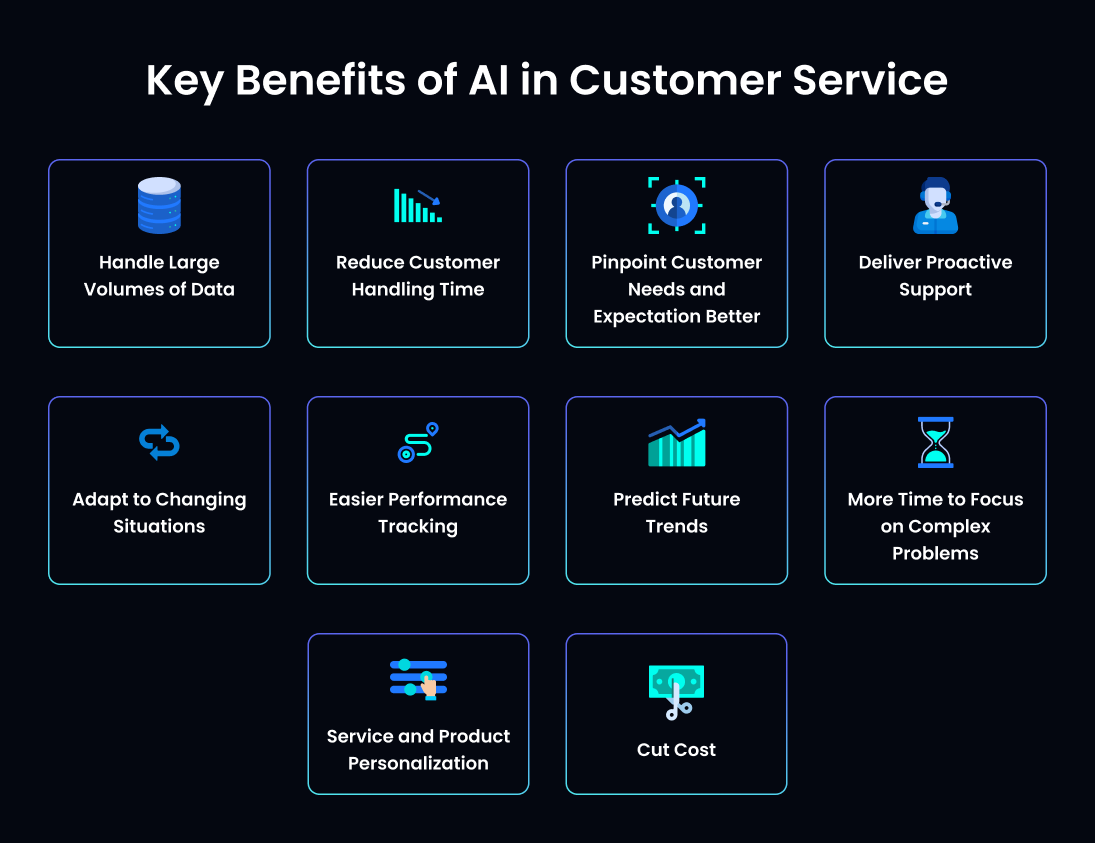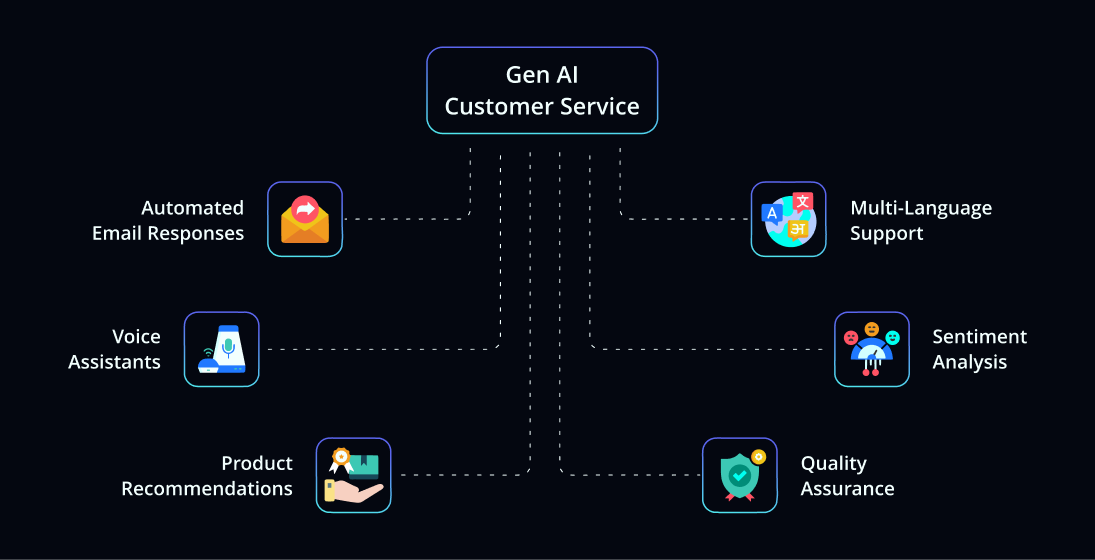The emergence of generative artificial intelligence is profoundly transforming client service. Firms use genAI solutions to improve client service, streamline operations, and increase revenue. This blog post will explore how generative AI in customer service works and highlight different use cases. We will also highlight what managers need to consider when implementing such technology.
What Is GenAI in Customer Service, and Why Does It Matter?

Let’s start by defining this trendy solution. GenAI utilizes large language models (LLMs) to compose quality content automatically. This could be text, pictures, music, code, etc. The most famous examples of LLMs are OpenAI’s ChatGPT and Google’s Gemini. They successfully handle various tasks, including writing and transforming of content, conversational assistance, and correct translation. Let’s look at the main advantages of generative AI in customer service:
- Lowering expenditures. Expanding customer service teams is expensive, not only in terms of salaries but also in terms of training and infrastructure scaling. GenAI helps avoid this by offering an efficient method for processing significant volumes of cooperation. It is essential for startups and small businesses.
- Adaptable development. GenAI can easily cope with client requests as the business grows. You may quickly transform your small department into a generative AI contact center. They can be rapidly deployed and often do not require significant effort. This scalability prevents overwhelming loads of live agents.
- Individual interaction. GenAI may use user history and preferences to ensure personalized service. Such activity takes a lot of time from live agents. GenAI expertly recommends add-ons and special loyalty rewards for purchases.
With smart solutions, generative AI customer support quality will be consistently high, and every consumer will feel equally valued.
How does GenAI Transform Customer Support?

Applications of generative AI in customer service include a long list of functions. They improve the interaction between the firm and clients and increase operational efficiency:
- Chatbots and online assistants. Virtual agents use modern natural language processing (NLP) tools to interpret and answer consumer requests. Such bots handle repetitive tasks, e.g., providing product data, troubleshooting common problems, processing orders, etc. Systems offer 24/7 accessibility and instant answers, decreasing the burden on live agents.
- Expanding the potential of client self-service. GenAI allows firms to implement self-service technologies that allow clients to solve problems independently. Consumers can quickly get answers to questions through conversational interfaces. This minimizes the involvement of live agents, allows issues to be resolved quickly, and raises consumer retention.
- Sentiment analysis. GenAI analyzes the client’s mood in real time, defining his positive and negative emotions during a conversation. By understanding the buyer’s mindset, firms may identify potential difficulties, quickly resolve problems, and personalize cooperation.
- Predictive capabilities. With client datasets and machine learning (ML) instruments, genAI predicts potential problems and needs before they arise. By learning from past dealings and behavior patterns, firms may communicate with consumers to suggest help and prevent troubles.
- Instant language translation. AI-backed bots with automatic translation functions can communicate with clients in the language of their choice, overcoming any barriers and expanding sales geography. This feature increases consumer gratification and retention.
GenAI continually learns from past cooperation with buyers to optimize knowledge stores and improve the accuracy and quality of answers. By processing colossal datasets, genAI instruments define common problems, update information bases, and enhance response algorithms.
Main Challenges with AI in Client Service
Despite these advantages, AI-backed client service solutions have some limitations:
- Problems with sensitivity. Although gen AI in customer service provides quick and relevant answers, it may have difficulty understanding and correctly interpreting a user’s emotional signals, diminishing the quality of cooperation.
- Restricted recognition of context and nuances. AI-backed support solutions do not always grasp the context or specifics of consumer requests, which leads to misunderstandings and false answers.
- The result depends on the quality of databases. Client service effectiveness with AI depends on the quality and accuracy of the information utilized to teach and update the model. Poor data quality may lead to negative client experience.
The goal is to utilize AI to improve the productivity of live agents and provide multilingual support. However, it is crucial to retain live specialists to perform empathy-based tasks.
Tips and Reminders for Adopting GenAI in Client Support?
GenAI is showing significant potential — and it’s attracting the attention of business owners. In fact, about 75% of executives are betting on smart solutions, believing they will give them a competitive advantage. We’ve developed a roadmap for navigating each critical stage of successful genAI implementation.
- Determining business goals. They can include increasing consumer satisfaction, decreasing response times, raising efficiency, and optimizing resource allocation.
- Analysis of current customer interaction processes. Analyze consumer collaboration, highlight pain points, common requests, and fields where AI may provide the most value. Define repetitive and time-consuming tasks to automate.
- Select the optimal AI-backed products. Explore various genAI solutions in client service. Key elements of AI include NLP, chatbots, sentiment analysis, and predictive analytics systems. Choose a scalable tool that meets your business needs.
- Determine the optimal support channels. Ensure you add AI to all consumer dealing channels, including email, social media, live chat, and phone consultations. Develop AI chatbots to manage everyday client requests and provide instant support.
- Prepare data collection. The genAI model needs to select high-quality data to prevent hallucinations and bias. Collect consumer cooperation history, support calls, and client data. Ensure that information is securely protected, labeled, and anonymized.
- Enable Predictive CX. Add sentiment analysis based on consumer reviews to gauge their satisfaction levels and proactively identify potential challenges. Apply ML to forecast buyer behavior and analyze their needs. This will help technical support experts work proactively rather than looking for a way out of a critical situation.
Define your smart solution’s measurements and KPIs early to estimate the success of your AI tactic. Parameters such as consumer satisfaction, response period, and expenditure reduction will help measure the effect of AI.
Final Words
Effectively adopting customer service automation requires a systematic approach. Improving client support with genAI solutions involves rethinking outdated procedures and improving how we collect, process, and apply information to make smart decisions quickly. These changes will benefit everyone involved—staff, clients, partners, and society.
We would like to remind you that all processes must be tested and double-checked before companies actively use genAI. Any mistakes can put your company in an awkward position. You can book a demo from MetaDialog to learn more about the operating principles of genAI solutions. Our specialists will customize all features based on your needs and datasets.
